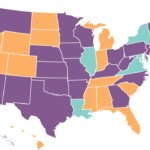Across America, millions of people living with rheumatic disease are finding it increasingly difficult to afford their treatments and access specialized healthcare. That’s why the American College of Rheumatology and its Simple Tasks public awareness campaign have released a first-of-its-kind Rheumatic Disease Report Card. The report card seeks to answer the question: “How easy is it to live with rheumatic disease in my state?”
“The goal is to both inform and empower the public and policymakers to address key healthcare access, affordability and lifestyle issues that impact quality of life for the millions of Americans who live with a doctor-diagnosed rheumatic disease,” says Kelly Weselman, MD, FACR, RMSK, RhMSUS, chair of the ACR’s Communications and Marketing Committee and a rheumatologist with Wellstar Rheumatology, Smyrna, Ga. “With approximately 25% of the U.S. population living with a rheumatic disease, we need to prioritize issues that are limiting the medical care of patients. We cannot afford to ignore this.”
Grading Rheumatology Care
The report card, launched as part of Rheumatic Disease Awareness Month (RDAM), was created by an interdisciplinary ACR task force comprising practicing rheumatologists from the College’s committees on Communications and Marketing, Government Affairs and Rheumatology Care. Task force members, including Dr. Weselman, were responsible for determining the report card grading indicators, methodology and weighting, and key messages.
The report card assigns grades to individual states according to their progress on three important aspects of care:
- Providing adequate access to rheumatology care;
- Ensuring rheumatic disease care is affordable; and
- Encouraging healthy lifestyle habits that ease the burden of rheumatic disease.
Maryland was the only state to receive an A, based on high marks in all three categories. The report notes that opportunity exists for the state to increase its affordability score by taking such measures as strengthening its Pharmacy Benefit Manager transparency laws to help make care more affordable.
Alabama and Oklahoma have the most room for improvement; both received a D overall.
The majority of states received a C, including Dr. Weselman’s home state of Georgia. Although her state was given high marks in the activity category because it has several CDC-funded arthritis intervention programs, Georgia has an opportunity to improve its access score by expanding health insurance coverage to more people.
“These state grades provide a clearer view of the challenges our patients and providers are experiencing and identify overall that there is a lot of work needed to improve the quality of life for Americans living with rheumatic diseases,” Dr. Weselman says. “Turning the tide on this public health crisis will require patients, physicians and policymakers working together to address the access, affordability and lifestyle factors that can help patients living with pain and disability live a better, healthier life.”
Empowering Patients to Act
With new knowledge gleaned from a state’s individual grade, the ultimate goal of the report card is to give all Americans the knowledge to speak out about the challenges people living with rheumatic diseases face, in terms of the direct medical care they are receiving and the broader impact to care caused by barriers on a national scale, such as care access and affordability, Dr. Weselman explains.
She notes two key factors underlying most states’ mediocre grades:
- Poor access: These grades were the result of high rates of residents without health insurance, a severe shortage of rheumatologists and weak laws limiting insurer practices, such as step therapy.
Example: In Arizona, which received a C in the access category, there is only one practicing rheumatologist for every 139,000 people. Whereas, in Massachusetts, which received an A in the access category, there is one rheumatologist for every 19,000 people—a ratio nearly seven times higher. - Poor affordability: Twenty-six states received an F in the affordability category because they have not enacted legislation to require drug pricing transparency from pharmacy benefit managers nor to limit the use of specialty tiers that can result in patients paying thousands of dollars out of pocket each month.
Inviting Physicians to Speak Out
Certain states have found success with addressing issues of affordability on the legislative front in such areas as biosimilars, fail-first, prior authorization and specialty tiers. Example: In Arkansas, rheumatologists have had a strong voice in supporting laws that regulate insurers’ step therapy requirements.
Along with the report card grades, Dr. Weselman hopes an understanding of the legislative efforts and wins happening across the country at the state and federal levels can inspire rheumatologists to pursue and support similar legislation that can make a difference in promoting a better quality of life for rheumatology patients.
Does Your State Make the Grade?
Share your state’s report card on access to care, and encourage patients and families to share their stories and take action as part of RDAM this September. You can also encourage patients to take the ACR’s new online Pledge to Live Well. Pledge takers will receive a pedometer and wristband to encourage them to stay active.
Carina Stanton is a freelance science journalist in Denver.

